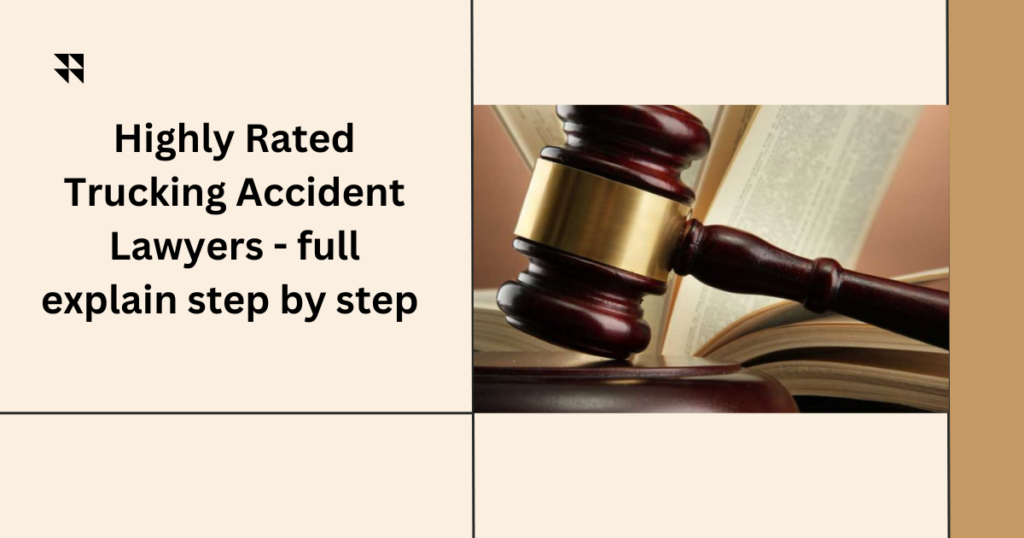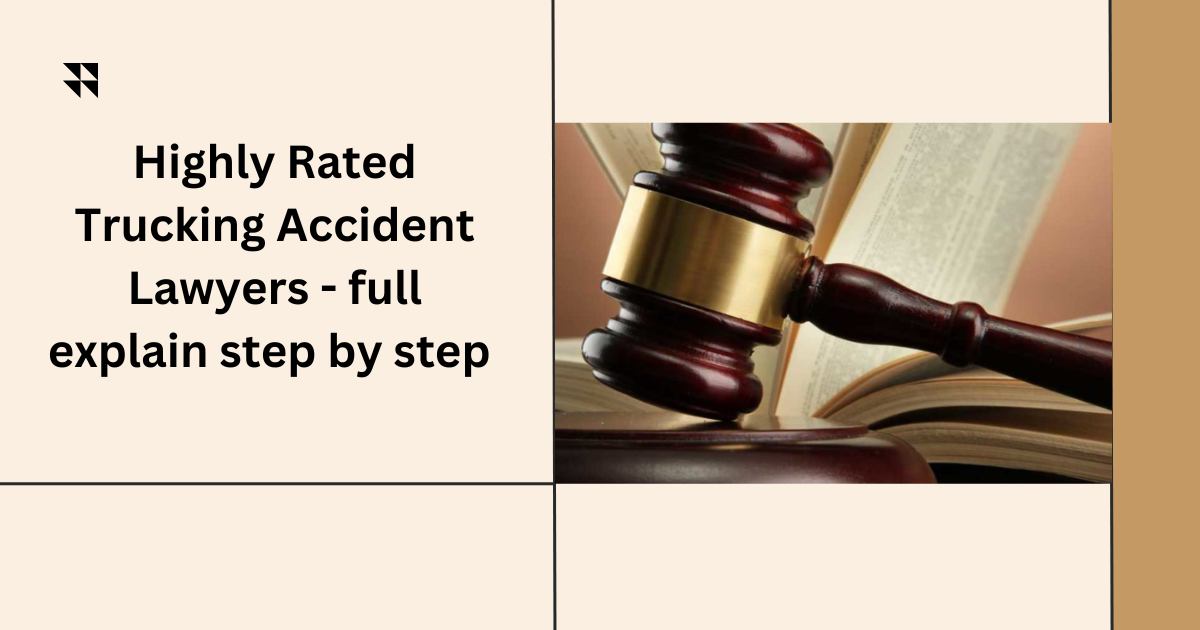Trucking accidents are among the most complex types of motor vehicle accidents due to the interplay of federal regulations, state laws, and the involvement of various parties such as trucking companies, drivers, and insurance firms. Therefore, hiring a highly-rated lawyer who specializes in trucking accidents is crucial. These legal professionals possess the expertise necessary to navigate the intricate legal landscape, ensuring that all relevant laws and regulations are considered when pursuing a claim.
Scope of Trucking Accidents
Given the sheer size and weight of commercial trucks, accidents involving these vehicles often result in severe injuries, fatalities, and extensive property damage. Understanding the specific causes, legal implications, and avenues for compensation in trucking accidents is essential for those affected. Specialized lawyers are equipped to handle the unique challenges these cases present, providing victims with the best chance of securing the compensation they deserve.
Why Hire a Specialized Lawyer for Trucking Accidents?

Expertise in Federal and State Regulations
Trucking accident lawyers bring a deep understanding of the Federal Motor Carrier Safety Administration (FMCSA) regulations and relevant state laws that govern the trucking industry. These regulations cover a wide range of issues, including driver qualifications, hours of service, vehicle maintenance, and safety standards. A specialized lawyer ensures that every applicable regulation is scrutinized and leveraged to build a robust case.
Knowledge of Industry Standards
Experienced trucking accident lawyers are well-versed in industry standards and practices. This knowledge is crucial in identifying regulatory violations that may have contributed to the accident. For instance, a lawyer might uncover that a trucking company failed to adhere to proper cargo loading procedures or neglected essential vehicle maintenance, thereby contributing to the crash. Such insights are invaluable in establishing negligence and liability.
Handling Complex Liability Issues
Trucking accidents often involve multiple parties, each potentially bearing some responsibility. These parties can include the truck driver, the trucking company, the vehicle manufacturer, and even third-party maintenance providers. A specialized lawyer has the skills to untangle these complex liability issues, ensuring that all responsible parties are identified and held accountable. This comprehensive approach increases the likelihood of a successful outcome.
Access to Resources and Experts
Highly-rated trucking accident lawyers typically have access to a network of experts who can provide critical support in building a case. These experts might include accident reconstructionists who can recreate the scene to determine how the crash occurred, medical professionals who can testify about the extent of injuries and necessary treatments, and economists who can calculate the financial impact of the accident on the victim’s life. This expertise is pivotal in presenting a compelling case and maximizing compensation.
Steps to Take After a Trucking Accident
Immediate Actions
After a trucking accident, ensuring safety is paramount. Victims should move to a safe location if possible and call emergency services. Seeking medical attention is crucial, even if injuries appear minor, as some injuries might not be immediately apparent. Reporting the accident to the police and ensuring that a detailed report is filed will provide essential documentation for any future legal proceedings.
Gathering Evidence
Collecting evidence at the scene of the accident is critical. This includes photographing the accident scene, vehicle damage, road conditions, and any visible injuries. Gathering contact information from witnesses, the truck driver, and other involved parties is also important. Additionally, preserving evidence such as damaged personal property and keeping all medical records and receipts related to the accident will be beneficial when building a legal case.
Contacting a Lawyer
Researching and finding a reputable lawyer who specializes in trucking accidents is a crucial step. Seeking recommendations from friends, family, or professional networks can be helpful. Many lawyers offer free initial consultations, which provide an opportunity to discuss the case, evaluate the lawyer’s expertise, and understand their approach. Once a suitable lawyer is found, formalizing the agreement through a retainer and understanding the fee structure and potential costs will set the groundwork for the legal process.
Building a Strong Case
Investigation and Evidence Collection
A thorough investigation and evidence collection are vital components of building a strong case. This process often involves working with accident reconstruction experts to recreate the accident scene and determine the sequence of events leading to the crash. Reviewing the truck driver’s logs, maintenance records, and the trucking company’s compliance with federal and state regulations is essential. Gathering witness testimonies from other drivers, pedestrians, and first responders can provide additional support and insights into the accident.
Establishing Liability
Proving liability in trucking accidents involves multiple facets. Driver error is a common factor, and proving that the truck driver was negligent, such as by driving under the influence, distracted driving, or violating hours of service regulations, is often a key aspect. Company negligence can also play a significant role, such as when a trucking company fails in its duty to maintain the vehicle, properly vet drivers, or comply with safety regulations. Additionally, identifying defects in the truck or its components that may have contributed to the accident can establish manufacturer liability.
Calculating Damages
Accurately calculating damages is crucial for ensuring that victims receive fair compensation. This includes accounting for immediate and ongoing medical expenses, rehabilitation costs, and any future medical needs. Lost wages due to time missed from work and any potential loss of earning capacity are also important factors. Compensation for pain and suffering, which addresses physical pain, emotional distress, and reduced quality of life, should be considered. Property damage, covering the cost of repairing or replacing damaged vehicles and personal property, and in cases of gross negligence, seeking punitive damages to punish the wrongdoer and deter future misconduct, are also part of the calculation.
Litigation vs. Settlement
Settlement Negotiations
Settlement negotiations often begin with the lawyer sending a demand letter to the responsible parties, outlining the injuries, damages, and the amount of compensation sought. Engaging in negotiations with the trucking company’s insurance representatives aims to reach a fair settlement without going to court. If direct negotiations fail, mediation can be an effective tool to resolve disputes with the help of a neutral third party. This process can save time and resources while still achieving a satisfactory resolution.
Preparing for Trial
If a settlement cannot be reached, preparing for trial becomes necessary. This involves the discovery process, where both parties exchange relevant information and evidence through depositions, interrogatories, and document requests. Pre-trial motions might be filed to exclude certain evidence, dismiss parts of the case, or resolve other legal issues. Developing a compelling trial strategy, preparing witnesses, and organizing evidence are critical steps to ensure a strong presentation in court.
Trial Proceedings
During trial proceedings, each side presents an overview of their case to the jury through opening statements. The plaintiff’s lawyer presents evidence and calls witnesses to prove liability and damages, followed by the defense’s cross-examination to challenge their testimony. The defense then presents its case, providing evidence and witnesses to refute the plaintiff’s claims. Closing arguments allow both sides to summarize their cases and make a final appeal to the jury. After deliberation, the jury returns a verdict on liability and damages, concluding the trial process.
Selecting the Right Lawyer
Evaluating Experience and Track Record
When selecting a lawyer for a trucking accident case, evaluating their experience and track record is crucial. Look for lawyers with significant experience specifically in trucking accident cases, as this specialization ensures they are well-versed in the unique aspects of such cases. Reviewing the lawyer’s track record of successful settlements and verdicts in similar cases provides insight into their capability to secure favorable outcomes. Additionally, checking reviews, ratings, and testimonials from previous clients can help gauge their reputation and reliability.
Assessing Communication and Availability
Effective communication and availability are essential qualities in a lawyer. Choose a lawyer who is responsive and readily available to answer questions and provide updates on the case. Personal attention from the lawyer handling the case is important, ensuring that they do not pass it off to junior associates without adequate supervision. This level of dedication and accessibility can significantly impact the success of the case and the overall client experience.
Understanding Fee Structures
Understanding the fee structure of potential lawyers is a critical step in the selection process. Many trucking accident lawyers work on a contingency fee basis, meaning they only get paid if the case is won. This arrangement can alleviate the financial burden on victims and align the lawyer’s incentives with the client’s success. It is also important to clarify any costs and expenses that might be the client’s responsibility, such as court fees, expert witness fees, and administrative expenses. This transparency helps avoid unexpected financial obligations.
Initial Consultation
Preparing for the initial consultation with a potential lawyer involves bringing all relevant documents, including the police report, medical records, and any correspondence with insurance companies. During this consultation, asking pertinent questions about the lawyer’s experience, strategy for the case, potential challenges, and estimated timeline can provide a clearer picture of what to expect. This meeting is an opportunity to assess the lawyer’s suitability for the case and to establish a foundation for a successful attorney-client relationship.
Initial Consultation
Preparing for the initial consultation with a potential lawyer involves bringing all relevant documents, including the police report, medical records, and any correspondence with insurance companies. During this consultation
Please Read More: Vehicle accident lawyers near me Best information and completed guide.
Please Read More: Comprehensive Guide to Crash Attorneys: Truck Accident Lawyers – best guide
Conclusion
I hope that you would have liked some other posts. Friend, if you liked this post, then you must like this post and share it with your friends. I know that you would have liked the given information very much. If you are related to this question, If you have any questions, please leave a leave a comment.
